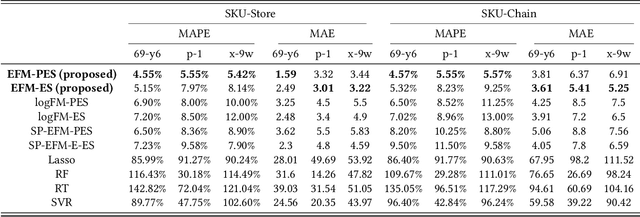Brenda Cheang
An Exponential Factorization Machine with Percentage Error Minimization to Retail Sales Forecasting
Sep 22, 2020



Abstract:This paper proposes a new approach to sales forecasting for new products with long lead time but short product life cycle. These SKUs are usually sold for one season only, without any replenishments. An exponential factorization machine (EFM) sales forecast model is developed to solve this problem which not only considers SKU attributes, but also pairwise interactions. The EFM model is significantly different from the original Factorization Machines (FM) from two-fold: (1) the attribute-level formulation for explanatory variables and (2) exponential formulation for the positive response variable. The attribute-level formation excludes infeasible intra-attribute interactions and results in more efficient feature engineering comparing with the conventional one-hot encoding, while the exponential formulation is demonstrated more effective than the log-transformation for the positive but not skewed distributed responses. In order to estimate the parameters, percentage error squares (PES) and error squares (ES) are minimized by a proposed adaptive batch gradient descent method over the training set. Real-world data provided by a footwear retailer in Singapore is used for testing the proposed approach. The forecasting performance in terms of both mean absolute percentage error (MAPE) and mean absolute error (MAE) compares favourably with not only off-the-shelf models but also results reported by extant sales and demand forecasting studies. The effectiveness of the proposed approach is also demonstrated by two external public datasets. Moreover, we prove the theoretical relationships between PES and ES minimization, and present an important property of the PES minimization for regression models; that it trains models to underestimate data. This property fits the situation of sales forecasting where unit-holding cost is much greater than the unit-shortage cost.
* Accepted by ACM Transactions on Knowledge Discovery from Data (ACM TKDD)
 Add to Chrome
Add to Chrome Add to Firefox
Add to Firefox Add to Edge
Add to Edge